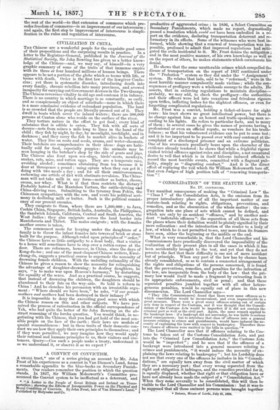CIVILIZATION IN CHINA.
Tim Chinese are a wonderful people for the exquisite good sense of their propositions and the surprising results in practice. In a letter to the Registrar-General, published in the Journal of the Statistical Society, Sir John Bowring has given us a better knowledge of the Chinese—and, we may say, of himself—in a very graphic summary of some of the traits of that immense empire with its three or four hundred millions of human beings. There appears to be not a portion of the globe which so teems with life, or teems with death. Order is the first law of the lawgiver Confucius; yet there is systematic disorder, introducing death into every family, chronic rebellion into many provinces, and avowed incapacity for carrying out Government decrees in the Two Quangs. The Chinese reverence vitality, in old age and contemn it in infancy. There is no country in which marriage is so constantly, so early, and so conspicuously an object of solicitude—none in which there is a more conclusive evidence of redundant population. The land is so crowded that the people are literally pressed out of it. They dwell in boats which cover Cie inland waters ; there are 300,000 persons at Canton alone who reside on the surface of the river. They torture nature in the effort to get food ; every kind of substance that is edible is eaten. They fish with all sorts of decoys—nets from seines a mile long to lines in the hand of the child • they fish by night, by day, by moonlight, torchlight, and in darkness ; and they carry the fish to market alive in buckets of water. They live on roots and seeds, arums, and water-chesnuts. Their butchers are comprehensive in their ideas : dogs are habitually sold for food, especially puppies : the animals may be seen hanging in the butcher's shop by the side of goats and pigs. The Chinese also feast upon sea-slugs birds'-nests, monkeys,. snakes, rats, mice, and rotten eggs. They are a temperate race, avoiding alcohol ; sometimes abstaining from tea because it is dear at threepence a pound ; using opium when they. can get it ; doing with two meals a day ; and for all their ommvorousness, eschewing one article of diet with obstinate revulsion. The Chinaman will not-take milk in any form—neither as butter, cheese, cream, nor whey. What is it that thus restricts the dietary ? Probably hatred of the Mantehou Tartars, the cattle-driving and China-driving race. Submitting to the tyranny from Pekin, the Chinaman sympathizes with the cow, and vents his political acrimony in declining milk or butter. Such is the political consisteney of our present enemies. They emigrate to Siam, where there are 1,500,000 • to Java, Cochin China' Singapore, British India, Australia, the Philippines, the Sandwich Islands California Central and South America, the
West Indies ; they ;Ise also across the land border into Mantchouria and Thibet. The males emigrate ; with the females another course is taken.
The commonest mode for keeping under the daughters of a family is to throw the infant females into towers of brick or stone built for the purpose. Although ruled upon principles of "order," the Chinese have so little antipathy to a dead body, that a visitor to a house will sometimes have to step over a rotten corpse at the door. There are reformers, however, in China, since the days of Kong-fu-tse ; and one of the most eloquent Chinese writers, Kweichung-fu, suggests a practical course to supersede the necessity of drowning female children. With the unfailing rationality of the Chinese he gives a reason to show the necessity for relinquishing the advantage of daughter-drowning: to destroy daughters, he says, "is to make war upon Heaven's harmony," by disturbing the equality of the sexes. And as a practical course, he suggests, that instead of drowning the children, the daughters should be abandoned to their fate on the way-side. So bold is reform in China ! And he clenches his persuasion with an irresistible argument: "Where should we have been," he asks, "if our grandmothers and mothers had been destroyed in their infancy ?' It is impossible to deny the exceeding good sense with which the Chinese reason on this and other subjects. We have perceived the process of ratiocination in the official correspondence of
Yeh, who had quite the better of Sir John Bowring on the abstract reasoning of the lorcha question. You would think, in negotiating with the Chinese, that you had got hold of the most sensible people on the face of the earth ; their laws are models of quaint reasonableness : but in these traits of their domestic conduct we see how they apply their own principles to themselves ; and if they were permitted, we may imagine how they would apply their rational and humane principles to us, their visitors and customers. Query—Can such a people make a treaty, understand it as we understand it, or observe it as we expect ?


































 Previous page
Previous page